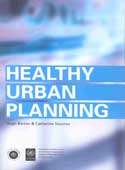Healthy urban design

Healthy urban planning is about planning for people. It means putting the needs of people and communities at the heart of the urban planning process and considering the implications of decisions for human health and well-being. It also means finding the right balance between social, environmental and economic pressures and therefore has much in common with planning for sustainable development. The concept is based on core Healthy Cities principles of equity, intersectoral cooperation, community involvement and sustainability.
Healthy urban planning was one of the three core themes in Phase IV of the WHO European Healthy Cities Network. The overall goal was to integrate health considerations into cities’ urban planning processes, programmes and projects and to establish the necessary capacity and political and institutional commitment to achieve this goal.
Urban planners and related professionals can transform the conditions in which people live and work, their access to facilities and services, their lifestyles and their ability to develop strong social networks. These are key determinants of the health, well-being and quality of life of people in cities. WHO’s work in this area explores the links between health and urban planning and focuses on how urban planning can positively affect health.



